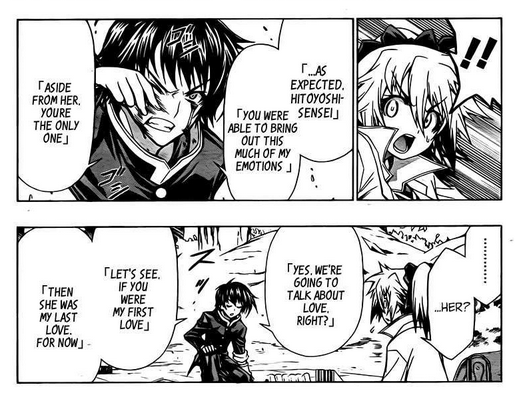「In the manga, Misogi Kumagawa talks with his words inside quotation marks, just like this.」
「Here's a typical example:」

「Why is this? Is there a specific reason he has this notation while talking?」
「In the manga, Misogi Kumagawa talks with his words inside quotation marks, just like this.」
「Here's a typical example:」

「Why is this? Is there a specific reason he has this notation while talking?」
The reason why Kumagawa's "speaks" in brackets is a bit of a pun (see 『カギカッコ』). The context here implies literally [括弧]{かっこ}つける (kakko tsukeru), meaning "to add brackets/parenthesis (to something, e.g., a sentence)." The pun involves a well-known expression [格好]{かっこ}つける (kakko tsukeru), meaning "to show off or try to look cool." Kumagawa speaks in the way he does because he is trying to sound cool.
One thing to note about 格好 is it's a kanji with irregular kana usage. おう (ou) like えい (ei) is what's called a "long vowel." The おう (ou) is essentially a long "oo" sound. Historically [格好]{かっこう} (kakkou) is the correct spelling, however in certain, more colloquial contexts the う is omitted for purposed such as brevity.
In chapter 88 of the manga, when Kumagawa returns to the dream classroom and ask Ajimu for his original Minus back. Ajimu asks him to express himself sincerely, without brackets if he wants it back.
He replies w/o square brackets.
It should be noted that he speaks using "double square brackets" (二重鉤括弧 『 』) used to mark quotes within quotes. In Japanese fiction this type of square bracket is often used to denote something heard through another device. It's implied in the case of Kumagawa that what we are seeing is essentially subtitles. We're hearing the literal meaning being his cool words.
There is a common mistake by the translator in the words of Kumagawa. The origin of the meaning of parentheses, whether in the anime or manga, has two reasons in the Japanese language. The first reason is that the words inside the brackets are all lies. The second reason is that the words inside the brackets are said in a single tone of voice without any feelings, whether anger, sadness or joy, and I think that Kumagawa uses both reasons